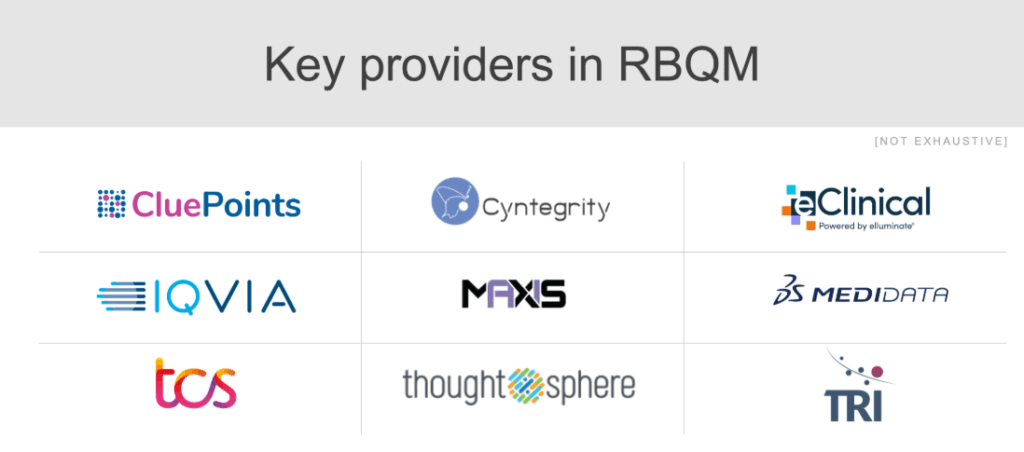
In an era of increasingly complex clinical trials, Risk-Based Quality Management (RBQM) has emerged as more than a regulatory mandate, it is a strategic imperative. Traditional monitoring methods, reliant on exhaustive on-site visits and 100% Source Data Verification (SDV), are proving unsustainable. Today’s clinical environment demands agility, real-time decision-making, and proactive risk management, not reactive oversight.
While the RBM (Risk-Based Monitoring) era introduced smarter site prioritization, modern trials demand a more holistic approach. integrates Quality by Design (QbD) principles right from the protocol design phase, embeds Critical-to-Quality (CtQ) factors into operational processes, and leverages centralized analytics to monitor data quality and site performance in real time. The result: smarter trials, faster issue detection, and improved patient safety.
Reach out to discuss this topic in depth.
Trends driving RBQM adoption and innovation
In our recently published Tech Vendor Spotlight: Risk-based Quality Management (RBQM) report, we have identified and evaluated top 9 RBQM technology providers shown below:

Some recent trends that we have observed in the RBQM technology landscape are:
- Regulatory momentum meets selective adoption: Regulatory bodies such as the Food and Drug Administration (FDA), European Medicines Agency (EMA), and the International Council for Harmonization (ICH) have accelerated RBQM adoption. The ICH E6(R3) and ICH E8(R1) updates explicitly call for proactive risk management, data integrity assurance, and quality-driven trial design. But in practice, adoption remains strongest among large pharmaceutical sponsors – mid-sized and smaller companies often lag due to resource, change, and maturity constraints
- The rise of agentic AI: RBQM platforms are evolving from static dashboards and alerts to agentic AI systems that can autonomously identify risks, suggest mitigation plans, adjust thresholds, and simulate protocols. This shift promises faster responses and more adaptive oversight. Providers are also introducing protocol parsing, auto-generated risk monitoring plans, and dynamic threshold adjustment to reduce configuration burden
- Convergence of data management and RBQM: Sponsors are increasingly seeking unified platforms that blend data management with quality monitoring. This convergence breaks silos between EDC, CTMS, operations, and oversight, enabling real-time signal detection across multiple domains
- Consulting + Platform Partnerships as Growth Engines: As RBQM adoption matures, platform vendors are partnering with consulting and analytics firms to bring both strategy and execution to clients. One such recent alliance is the eClinical Solutions–ZS Associates partnership (announced at SCDM 2025 in September). eClinical Solutions contributes to the technology foundation whereas ZS Associates brings advisory, operational models, and change frameworks. In the past, we have also seen CluePoints partnering with ZS Associates for RBQM. These partnerships reflect a broader pattern in which clients demand not just productized tools, but guidance and a custom approach to embed RBQM
What’s Next: Toward Predictive and Adaptive Quality Systems
RBQM is evolving toward a predictive, adaptive model, one that doesn’t just detect risks but anticipates and mitigates them automatically. AI models and simulation-based trial design could soon make proactive oversight the default, not the exception.
As adoption expands and partnerships deepen, the focus will shift from compliance-driven implementation to strategic differentiation, how well sponsors leverage RBQM to deliver faster, safer, and more reliable trials.
Final takeaway
RBQM isn’t just a regulatory requirement, it’s a framework for operational excellence. The next phase of maturity will be defined by integration, intelligence, and industry collaboration.
Technology providers that blend AI-driven analytics with strategic consulting exemplify this convergence. The real transformation, however, lies in how sponsors turn these frameworks into everyday practice, creating trials that are not only compliant but continuously intelligent.
If you found this blog interesting, check out our new Transforming Clinical Trials with Risk-based Quality Management (RBQM) – Everest Group Research Portal report, which delves deeper into the RBQM landscape, trends, and top technology providers in this space.
To discuss how the partnership unlocks value for enterprises and service providers in more depth, please reach out to Nisarg Shah ([email protected]) and Kavya Murki ([email protected]).









